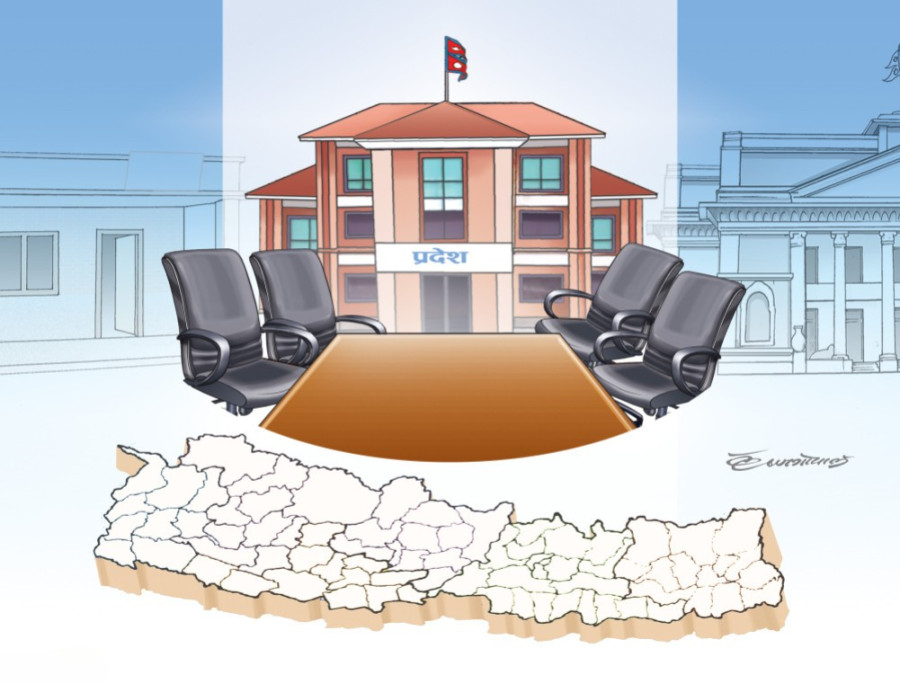Columns
Speak up for provinces
Political leaders must step forward to ensure that provinces function as autonomous entities.
Khim Lal Devkota
The winter session of the federal parliament began on January 31, 2025. On the first day of the National Assembly’s meeting, Krishna Prasad Sitaula, a Nepali Congress leader, emphasised the need for a serious commitment to implementing federalism, particularly regarding the provincial structure. He stressed that provinces should be allowed to exercise their constitutional rights without interference.
I listened to the speeches of all party leaders in the House of Representatives and the National Assembly, but no one spoke as strongly in favour of federalism as Sitaula did. He had played a crucial role as the right-hand man of then-Prime Minister Girija Prasad Koirala in resolving the Maoist and Madhesh conflicts through peaceful agreements. He deeply understands the essence of federalism and the importance of provinces.
However, it is unfortunate that provinces cannot function as intended within the federal structure.
Provinces in shadows
Provinces are synonymous with federalism and serve as the backbone of the constitution. If federalism weakens, the law of the land itself is at risk. Therefore, nurturing this system is a shared responsibility of the federal government and political parties. Unfortunately, the federal government has not committed to making the provinces functional and sustainable. They treat this subnational government as a subordinate rather than an autonomous entity, hindering its development. Chief ministers lack independence, as central leaders dictate appointments and decisions, even in minor cases.
The constitution grants state power to the provinces, including executive, legislative and judicial powers. However, the provinces lack control over essential elements such as personnel administration and police forces. Provincial police security has not been adjusted, and judicial authority remains unclear. Without real power, the provinces struggle to establish themselves as functioning government units.
The constitution provides provinces with authority over national forests, too. With this comes the responsibility of protecting them. Forest officers can take action against deforestation, prosecute smugglers and impose fines and penalties. However, federal government actors are now attempting to undermine provincial control over forests by arguing that provinces do not have the power to impose fines and penalties. As a result, provinces have not been able to fully exercise their constitutional rights over forests. In response, the Madhesh Province government has filed a case against the federal government, which is currently under consideration by the Supreme Court.
Provinces are also key drivers of development, according to the consitution. However, the federal government and political leadership have continued to perceive provinces as obstacles rather than enablers of progress.
One of the most contentious issues in federalism is the control over police administration. The constitution grants provinces exclusive authority over police forces, but the federal government has yet to implement this provision. Even parties that once advocated for strong provincial governance, such as the Maoists, have not prioritised this issue. Without police authority, provinces lack essential control over law and order, which diminishes their ability to govern effectively.
The institutional structure of provincial ministries and offices remains weak. In Madhesh Province, for instance, government buildings and facilities are inadequate. The offices of provincial ministers appear to be worse than those of non-gazetted officers in Singha Durbar. Other provinces face similar problems. This not only affects efficiency but also raises concerns over accountability and expenditure.
The federal government is responsible for supporting physical infrastructure development in provincial capitals, including constructing ministry buildings and office structures. However, provinces have not received the necessary support from the federal government in this regard. Sudurpashchim Province has even complained that the federal government has shown no interest in developing the infrastructure of its designated capital. While the provincial capital has been determined, there hasn’t been meaningful support from the federal government regarding land transfer and infrastructure development, which remains a major concern for the province.
A major issue at the provincial level is the lack of personnel. The federal government does not transfer employees on time, and even when they are assigned, many prefer to remain in Kathmandu. This lack of commitment has led to budget freezes in Madhesh and Karnali Provinces. Without a functional civil service at the provincial level, governance remains weak.
“We have to keep going to Singha Durbar, pleading for secretaries and staff, making requests and lobbying with the federal government,” say the chief ministers. They ask, “How can provinces be strong under such circumstances?”
Similarly, when employees are assigned through the federal government, their accountability remains more toward the federal government than the province. They have little dedication to their work and do not perform their duties with sincerity. Provinces are forced to function under these challenging conditions.
The federal civil service law has yet to be enacted despite nearly a decade since the promulgation of the constitution. This has disrupted governance at both provincial and local levels. Federal employees are reluctant to work in the provinces but seek promotions based on provincial postings.
The financial autonomy of provinces is also severely restricted. The budget allocation of the Ministry of Physical Infrastructure at the federal level alone surpasses the combined budget of all seven provinces. Federal ministries often direct funds to their own constituencies, reducing the resources available to provincial and local governments. Furthermore, fiscal transfers such as equalisation grants are often reduced by one-fourth, leaving provinces in a difficult fiscal position, as rightly pointed out by the Chief Minister of Lumbini Province to this author.
The Fiscal Commission, responsible for determining fiscal transfers, has been weakened by restrictive laws. The law has empowered the National Planning Commission in the budget formulation process. However, officials from the commission have complained that the Ministry of Finance disregards them. The constitution has strengthened the Fiscal Commission, but the law has limited its powers. Both the constitutional body, the Fiscal Commission and the Planning Commission, established by law, are meant to strengthen fiscal federalism. However, neither of these bodies has been effective.
The constitution mandates the formation of an Inter-Provincial Council to address provincial issues. However, this council has not convened since 2019. Additionally, the National Coordination Council, established to facilitate federal-provincial and local cooperation, has made numerous decisions on various thematic areas—including fiscal, administrative, and intergovernmental coordination—that remain unimplemented. The lack of coordination among different levels of government has created governance bottlenecks.
Pushing for genuine reforms
Several key steps must be taken to strengthen federalism. Provinces must be allowed to exercise the powers the constitution grants, including control over police and personnel administration. The federal civil service law should be enacted, and provinces should be given the authority to manage their own personnel. The federal government must assist in transferring necessary buildings and land to provincial governments.
Political parties should ensure that their representatives at the federal level support, rather than undermine, provincial governance. For the institutional development of federalism, the country needs individuals who are genuinely committed to strengthening the system.




 20.53°C Kathmandu
20.53°C Kathmandu















